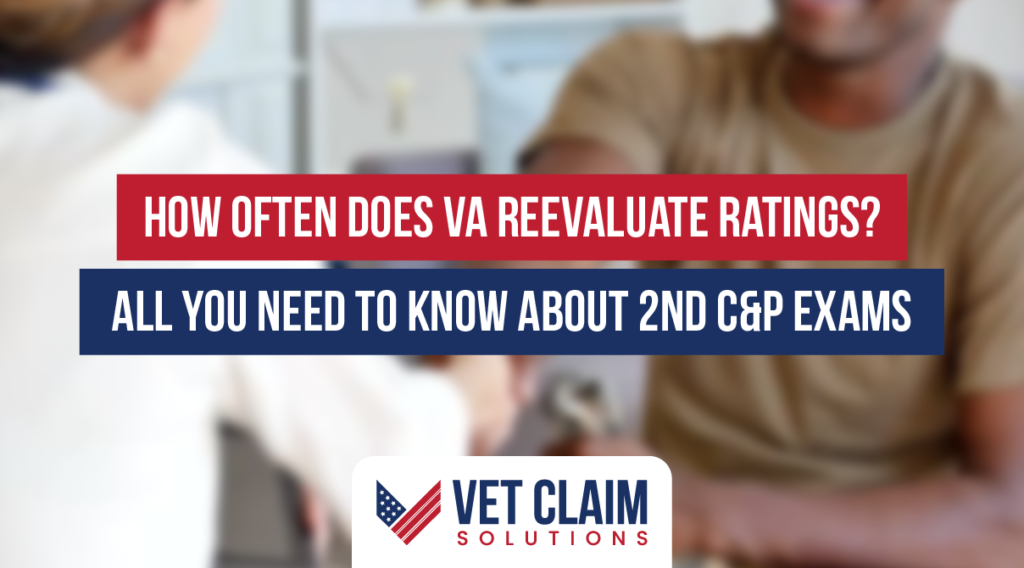The Department of Veterans Affairs (VA) periodically reevaluates the disability ratings assigned to veterans to ensure accurate and up-to-date compensation. One of the methods they use is a Compensation and Pension (C&P) exam, commonly known as a reevaluation or second examination. This article will explore how often the VA conducts these reevaluations and what veterans can expect during the process. Read on to learn more!
What Happens During a VA Second C&P Exam?
During a VA Second C&P exam, veterans undergo a reevaluation of their medical conditions or injuries for disability benefits. The VA schedules the exam with a qualified medical professional who reviews the veteran’s medical history, conducts a physical examination if necessary, and interviews the veteran about their symptoms and limitations. The examiner may also assess the veteran’s functional abilities and request essential diagnostic tests. Afterwards, a detailed report is prepared and submitted to the VA for review. Based on the exam results and other evidence, the VA decides on the disability benefits claim, which could lead to the continuation of the current rating, an increase, a reduction, or a denial of benefits, depending on the medical evidence presented. Veterans should be well-prepared and provide relevant information during the exam to ensure a fair evaluation.

VA Second C&P Exam: Is a Second C&P Exam a Good Sign?
A second C&P exam ordered by the VA can be a positive sign for veterans seeking disability benefits. There are several reasons why the VA may request a second C&P exam:

Reevaluation after a Bad First Exam:
If the veteran had a negative experience or received an unfavourable outcome from the first C&P exam, the VA may order a second exam with a different examiner. This indicates that the VA Rater recognizes the need for a second opinion and wants to ensure a fair assessment of the veteran’s condition.

Veteran’s Request for a New Exam:
In some cases, veterans may feel that the initial C&P exam did not accurately reflect their medical condition or failed to consider all relevant aspects. If the veteran contacts the VA (usually through the toll-free number 1-800-827-1000) to request a new C&P exam, and the VA agrees to their request, it can be seen as a positive indication that the VA is willing to reevaluate the claim.

Correcting Duty to Assist Errors:
The VA has a “Duty to Assist” veterans in the claims process. Suppose the VA Rater identifies errors in the first C&P exam related to the proper medical aetiology for service connection (direct, secondary, or aggravated). They may order a second exam to address these mistakes and ensure the veteran’s claim is properly considered. This helps to avoid a potential VA claim denial.
Overall, a second C&P exam provides an opportunity for a more thorough evaluation and can lead to a more favourable decision on the VA disability benefits claim. It shows that the VA is willing to review additional evidence and consider different perspectives to determine the veteran’s eligibility for benefits fairly. Veterans should approach the second C&P exam with transparency, providing all relevant information, and be prepared to discuss their medical condition openly to ensure an accurate evaluation.
Why Veterans Need Second C&P Examinations
Disabled veterans may need second C&P examinations, even without filing a claim for an increased VA disability rating. The VA may request a reexamination if there is evidence of a material change in the veteran’s disability or if the condition is likely to improve. For instance, if a veteran’s VA medical records show improvement in their service-connected condition, the VA may order a reexamination. Similarly, disabilities like back conditions that change over time might prompt regular reevaluations.

Upon receiving a rating decision from the VA, veterans may be informed of a scheduled future examination, typically every five years, for non-static disabilities. These examinations help determine if the veteran’s VA compensation should be adjusted based on the current disability level.
However, in some instances, no future examinations will be scheduled. These circumstances include static disabilities that show no improvement for five or more years, permanent and non-improving disabilities, veterans over 55, minimal rating level conditions, or disabilities where future examinations would not affect the combined disability evaluation.
It’s important to note that the VA doesn’t automatically schedule C&P examinations for increased rating claims. To trigger a duty for a C&P examination, there must be evidence of a material change in the veteran’s disability. The veteran’s statement of worsening without supporting evidence may not be sufficient to mandate a reexamination.
Overall, second C&P examinations allow the VA to assess the current level of disability and make appropriate adjustments to the veteran’s compensation based on the medical evidence provided. Veterans should know the criteria for scheduling future examinations and ensure they have substantial evidence to support their claims for increased ratings.
How Important is a VA C&P Exam?

The importance of a VA C&P exam cannot be overstated, as it plays a significant role in determining several crucial aspects of a veteran’s disability claim. These exams carry substantial weight in assessing whether the veteran’s condition should be considered service-connected and in evaluating the severity of their symptoms.
The results of the C&P exam are critical because VA Raters heavily rely on them when making key decisions regarding medical aetiology, service connection, and the level of disability severity. A positive outcome from a well-conducted C&P exam with a favourable medical opinion, stating that the condition is “at least as likely as not” related to military service, dramatically increases the chances of the VA approving the disability claim.
On the other hand, a negative outcome from a poorly performed C&P exam with an unfavourable medical opinion, indicating that the condition is “less likely than not” connected to military service, significantly raises the likelihood of the VA denying the claim.

In essence, the results of the C&P exam can make or break a veteran’s claim for disability benefits. Veterans must be well-prepared for the exam, provide comprehensive and accurate information about their condition, and ensure that the examining healthcare professional understands the full extent of their symptoms and limitations. Seeking professional assistance from accredited representatives or Veterans Service Organizations can also be beneficial in navigating the VA disability claims process and maximizing the chances of a favourable outcome.
How Do I Get a New C&P Exam?
If you believe you received an unfair or inadequate C&P exam and want a new C&P exam (second opinion) before the VA decides on your claim, there are several steps you can take to advocate for yourself:

Call the VA Hotline:
Contact the VA hotline at 1-800-827-1000 and speak to a representative. Explain your concerns about the previous C&P exam, provide specific details about what you believe went wrong, and request a new C&P exam. Ask the representative to make a note in your VA records documenting your request for further examination.

Write a Memorandum for Record (MFR):
Prepare a clear and concise Memorandum for Record detailing the issues you encountered during the previous C&P exam. Stick to the facts and include the situation’s who, what, when, where, why, and how. Mention any complaints about the examiner, questions about their qualifications, relevant information that was not considered, and your request for another examination or opinion. Upload this MFR to VA.gov, ensuring it becomes part of your official VA records.

Contact Your State Congressman:
If your initial attempts to request a new C&P exam through the VA hotline and MFR do not yield results, consider contacting your state’s congressional representative. They may have a constituent services office that can assist you in addressing your concerns with the VA.

File a Complaint with the White House VA Hotline:
If all else fails and you believe your case has not been appropriately addressed, you can file a complaint with the White House VA Hotline. This hotline is designed to help veterans resolve issues with the VA and ensure their concerns are heard.
Remember to remain patient and persistent throughout this process. Obtaining a new C&P exam can be challenging, but advocating for your rights and presenting evidence to support your claim is essential in ensuring a fair evaluation of your disability claim. Seeking assistance from accredited representatives or Veterans Service Organizations may also be beneficial in navigating the VA system and increasing the likelihood of a successful outcome.
FAQs
1: How often does the VA reevaluate disability ratings?
A: The VA must periodically reevaluate disability ratings to determine if there has been any change in a veteran’s condition. The frequency of these reevaluations varies depending on the severity of the disability.
2: What is a C&P exam?
A: A C&P exam, or Compensation and Pension exam, is an examination conducted by the VA to evaluate the extent of a veteran’s disability and determine the appropriate disability rating.
3: How does the VA determine if a disability rating should be reduced?
A: The VA may propose to reduce a disability rating if there is evidence that the veteran’s condition has improved and is no longer as severe as previously rated. However, the VA must follow a specific process and notify the veteran before reducing their rating.
4: Can the VA reduce my disability rating without notice?
A: No, the VA cannot reduce a veteran’s disability rating without proper notice and an opportunity to respond. The veteran must be informed of the proposed reduction and allowed to provide evidence or argument against the reduction.
5: What happens if the VA proposes to reduce my disability rating?
A: If the VA proposes to reduce a veteran’s disability rating, they will send a notice outlining the reasons for the proposed reduction. The veteran can provide additional medical evidence or argument against the reduction.
6: Can the VA reduce my disability rating if my condition is likely to improve?
A: If the VA determines that a disability is likely to improve, they may propose a reduction in the veteran’s disability rating. However, they must provide notice and an opportunity for the veteran to respond before making any changes.
7: What happens if my disability rating is reduced?
A: If a veteran’s disability rating is reduced, their disability compensation may be decreased. It is important to provide any new medical evidence or argument that supports maintaining the current rating to prevent a reduction in benefits.
Q: Can I request an increase in my disability rating?
A: Yes, if a veteran believes that their disability has worsened or they are entitled to a higher rating, they can request an increase in their disability rating. This can be done by providing new medical evidence or arguing for a higher rating based on the severity of the disability.
Q: Can the VA reevaluate permanent disability ratings?
A: Even if a disability rating is considered permanent, the VA has the authority to reevaluate the rating if there is evidence of a change in the veteran’s condition. However, the VA must follow the appropriate process and provide notice to the veteran.
Q: What is a protected VA disability rating?
A: A protected VA disability rating is a rating that is considered permanent and cannot be reduced unless there is evidence of fraud, a material error, or a substantial improvement in the veteran’s condition. These ratings are typically provided for conditions that are unlikely to improve.
Have Questions About Your VA Claim?
If you have questions or concerns about your VA claim, don’t hesitate to ask for help. VetClaim Solutions offers expert guidance and assistance throughout the entire claims process. Our knowledgeable vet coaches are here to support and answer any questions, ensuring you receive the benefits you deserve. Don’t go through this complicated process alone – let us assist you every step of the way.


